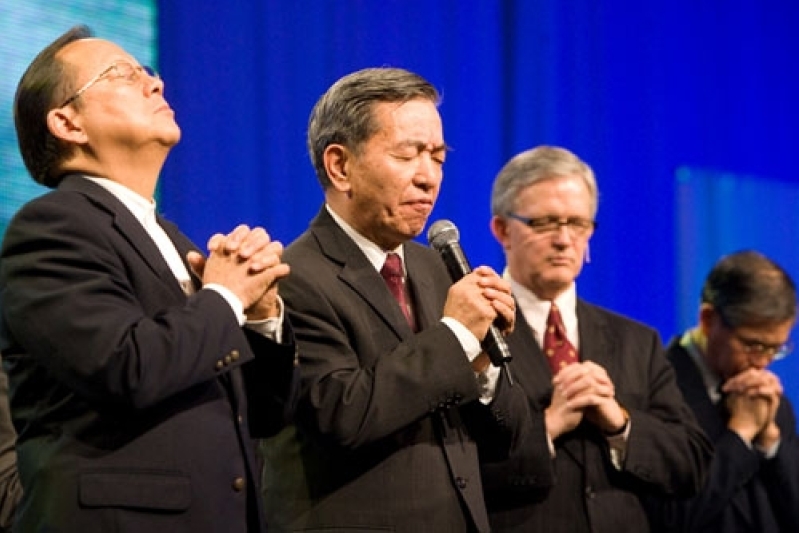
CAPE TOWN, South Africa – In an emotional evening, participants of the Lausanne Congress heard the song that the travel-blocked Chinese had planned to sing at the conference and the Scripture verses that they picked out for their situation.
Doug Birdsall, executive chair of The Lausanne Movement, expressed disappointment that China – which has the second largest evangelical population in the world behind Africa – was not well-represented at the Congress. China and Africa were scheduled to engage in a much-anticipated dialogue Monday evening that was canceled after members of the house church were prevented from leaving the country to attend Lausanne III.
In their greeting, the house church leaders chose verses from Philippians 1:29, about suffering for Christ, and James 1:29, about being slow to anger. They also sent the translated lyrics and the Chinese song, “Lord’s Love for China,” that they had planned to sing Monday night.
“Lord’s love in China lights up the hope for eternity. Lord’s love in China revives the soul of the faithful and blessed,” reads the chorus of the song.
The Chinese government in the weeks leading up to the Lausanne conference had blocked Chinese house church leaders from traveling abroad. But last week was when it became widely known that many of the invited participants had been stopped from catching their flights to the event.
House church leaders’ passports were confiscated at airports and at least one leader was detained after trying to fly out of the country from Beijing International Airport.
Archbishop Henry Luke Orombi of Uganda, the honorary chair of the African Host Committee of Lausanne III, commented that not having China at the world mission conference is like not having Brazil at the World Cup.
“It is unimaginable,” he said, in a statement.
During a press conference Monday, reporters asked Lausanne III leadership if they could have done a better job handling the Chinese invitation. Birdsall responded that conference organizers had consulted with Chinese leaders and allowed them to handle the invitation. He emphasized that although the China situation is regrettable, any “what if” question would only be speculative at this point.
“The selection criteria and process used by indigenous leaders in China was the same used by other national and regional selection teams around the world,” said Birdsall, in a statement. “We very much regret that our intentions and the decentralized invitation process to our Chinese brothers and sisters have been wrongly perceived,” he said, noting that Lausanne does not intend to challenge the Chinese government’s principle of “independent, autonomous and self-governed churches.”
The Chinese government was offended that the state church leaders of the Three-Self Patriotic Movement and the China Christian Council (TSPM/CCC) were not formally invited to represent China’s Christians when house church leaders were.
TSPM/CCC leaders requested to attend Lausanne, which organizers agreed to. But the TSPM/CCC could not affirm The Lausanne Covenant and commit to Lausanne’s vision, which is required of all participants.
Chinese state-churches adhere to the government’s rule that only approves of evangelism in state-approved religious venues and private settings. Public evangelism is prohibited. Also, TSPM/CCC places submission to state’s authority on the same level (if not above) submission to Christ’s authority.
Because TSPM/CCC leaders were unable to affirm The Lausanne Covenant and vision, they were invited to be observers rather than participants. Representatives of the Catholic and Orthodox churches are also participating in the conference as observers. The TSPM/CCC leaders, however, rejected the invitation to be Lausanne observers.
While most media coverage have criticized the Chinese government for prohibiting house church leaders from attending the historic conference, reporters at the press conference Monday grilled Lausanne leaders for not being more sensitive to the church-state dynamics in China. It is difficult to know who is to blame for the Chinese delegation's situation, but safer to say that Lausanne could have done a better job with its invitation to Chinese churches and the TSPM/CCC could have accepted to attend Lausanne as observers since they cannot affirm The Lausanne Covenant.
The Lausanne Movement began in 1974 when evangelist Billy Graham convened the first Lausanne Congress in Lausanne, Switzerland. Lausanne conferences have focused on how the Christian body, across denominational lines, can unite in world evangelization. The program for Lausanne III in Cape Town began Oct. 17 and will conclude Oct. 24.







